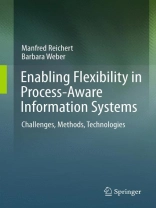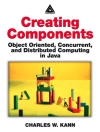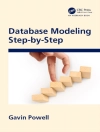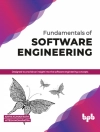In today’s dynamic business world, the success of a company increasingly depends on its ability to react to changes in its environment in a quick and flexible way. Companies have therefore identified process agility as a competitive advantage to address business trends like increasing product and service variability or faster time to market, and to ensure business IT alignment. Along this trend, a new generation of information systems has emerged—so-called process-aware information systems (PAIS), like workflow management systems, case handling tools, and service orchestration engines.With this book, Reichert and Weber address these flexibility needs and provide an overview of PAIS with a strong focus on methods and technologies fostering flexibility for all phases of the process lifecycle (i.e., modeling, configuration, execution and evolution). Their presentation is divided into six parts. Part I starts with an introduction of fundamental PAIS concepts and establishes the context of process flexibility in the light of practical scenarios. Part II focuses on flexibility support for pre-specified processes, the currently predominant paradigm in the field of business process management (BPM). Part III details flexibility support for loosely specified processes, which only partially specify the process model at build-time, while decisions regarding the exact specification of certain model parts are deferred to the run-time. Part IV deals with user- and data-driven processes, which aim at a tight integration of processes and data, and hence enable an increased flexibility compared to traditional PAIS. Part V introduces existing technologies and systems for the realization of a flexible PAIS. Finally, Part VI summarizes the main ideas of this book and gives an outlook on advanced flexibility issues.The book’s target groups include researchers, Ph D students and Master students in the field of information systems. After reading the book, they will better understand PAIS flexibility aspects. To support the easy use as a textbook, a series of exercises is provided at the end of each chapter and slides and further teaching material are available on the book’s web site www.flexible-processes.com. Professionals specializing in business process management (BPM) who want to obtain a good understanding of flexibility challenges in BPM and state-of-the-art solutions will also benefit from the presentations of open source as well as commercial process management systems and related practical scenarios.
表中的内容
Part I Basic Concepts and Flexibility Issues.- Introduction.- Process-Aware Information Systems.- Flexibility Issues in Process-Aware Information Systems.- Part II Flexibility Support for Pre-Specified Processes.- Process Modeling & Flexibility-by-Design.- Process Configuration Support.- Exception Handling.- Ad-hoc Changes of Process Instances.- Monitoring and Mining Flexible Processes.- Process Evolution and Instance Migration.- Business Process Compliance.- Part III Flexibility Support for Loosely-Specified Processes.- Concretizing Loosely-Specified Processes.- Constraint-based Process Models.- Part IV User- and Data-driven Processes.- User- and Data-driven Processes.- A Framework for Object-Aware Processes.- Part V Technologies Enabling Flexibility Support in Process-Aware Information Systems.- Arista Flow BPM Suite.- Alaska Simulator Toolset.- Existing Tool Support for Flexible Processes.- Part VI Summary, References, Appendices.- Epilogue.- Overview of BPMN Elements.
关于作者
Manfred Reichert is a professor at the University of Ulm (Germany). Prior to this, he was working as associate professor at the University of Twente (UT). At UT he was also leader of strategic research orientations on e‐health and on service‐oriented architectures, and member of the Management Board of the Centre for Telematics and Information Technology (CTIT), which is the largest ICT research institute in the Netherlands (with more than 400 researchers). His major research interests are next generation process management technology, service‐oriented architectures, and advanced applications for flexible process-aware information systems. Manfred is co‐founder of the industrial spin-off Arista Flow Gmb H, and he has been participating in numerous research projects in the BPM area and contributed more than 200 scientific papers on related topics. Barbara Weber is an associate professor at the Department of Computer Science at the University of Innsbruck, Austria, where she is a member of the Quality Engineering (QE) research group and head of the research cluster on business processes and workflows at QE. She has published more than 80 research papers at international conferences and articles in prestigious journals. Her research interests include integrated process life cycle support, change patterns, process flexibility, process modeling, user support in flexible, process-aware information systems, recommendations to optimize process execution, and empirical research in BPM.












